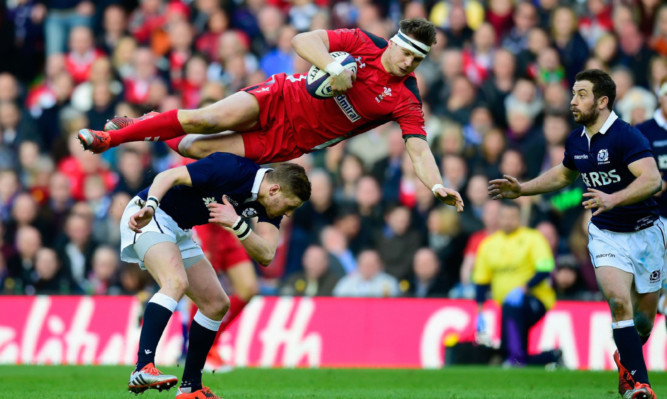Veteran wing Sean Lamont feels rugby’s laws should be adjusted to equalise the high-ball contest that could cost Scotland Finn Russell’s presence in Saturday’s RBS 6 Nations clash with Italy.
The Scotland fly-half is appealing against a two week ban for the incident in the 26-23 loss to Wales last week when his airborne opposite number Dan Biggar toppled over the 22-year-old as the Scot was taking evasive action.
Russell was yellow-carded by referee Glen Jackson but the card was upgraded to red by a World Rugby disciplinary panel last week and the ban that would rule him out of the Italy game implemented. The Scots immediately appealed and are waiting for details of how and where it will be heard this week.
The Scots have kept Russell in camp and are thought unlikely to switch captain Greig Laidlaw to 10 if the appeal is rejected. With Duncan Weir and Ruaridh Jackson injured, that would mean Greig Tonks or Peter Horne being in line for a first start at the key playmaking position against the Italians.
Meanwhile Lamont seems likely to retain his place in the team at the expense of Tim Visser, and feels Russell has been hard done by.
“Finn’s not too bad, he’s that kind of character,” said the 91-times capped wing. “It’s unfortunate that he might be missing this weekend but it is what it is, by the letter of the law, and what he’s been given is what they felt was appropriate. We just have to wait for the appeal.”
Lamont feels that the laws in relation to the high ball need examination.
“That law’s quite old, and maybe in the modern game it needs a bit of adapting. It happens quite a bit in rugby, and the focus recently has been a lot on scrums.
“Player safety’s a massive thing, of course, but it works both ways. If you’re throwing yourself up at a ball and putting your centre of gravity above someone, then yes, you can topple over with somebody just standing under.
“I think the law was brought in to protect the receiving player but it’s become such an attacking weapon that people can just throw themselves up and the advantage goes to them, even if they get their timing wrong in the air.
“The law doesn’t take into account the context of the situation. The risk is mis-timing, and in Finn’s case he moved forward and it looked like he went under Dan.
“The ref has a tough enough job with all the rules he’s got to consider, both teams nipping in his ear, and the crowd as well. He’s got split second decisions to make and replays showing something different. It’s not a job I’d want to do.”
In the meantime, Scotland are trying to temper their frustration of the Welsh result and instead focus on beating Italy for what would be the fourth time in succession.
“Retaining our confidence is a big thing,” he said. “Sometimes the closer you get to a win, the tougher it is to take those narrow defeats really hurt.
“But, because we can see we’re going in the right direction, it makes it so much more frustrating. These defeats hurt more.
“Every time we face Italy, it’s a major battle. They always seem to target us, just because of where we are in the standings of this tournament,
“But we are a different team than we have been in the past. We’re going in the right direction and now we’re not very far away.
“We left four tries out there against Wales, through not making the right decisions. We’re progressing but we’re not at a point where we can gloss over Italy.
“We made that mistake in 2007, 21 points down after 11 minutes or something. I think we tried to play it out too early that day, you have to go forward before you earn the right to go wide sometimes.
“That’s what they can do if you don’t show them enough respect. We know what’s facing us this weekend.”
